-
SPLIT (Choi Kook-hee 2016)
CHOI KOOK-HEE: SPLIT (2016)
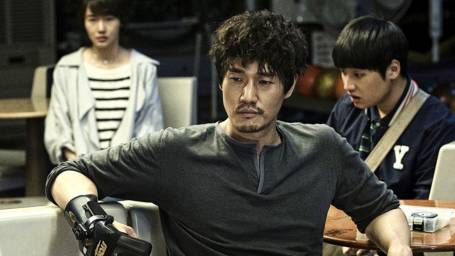
LEE JUNG-HYUN, YU JEE-TAE, AND DAVID LEE IN SPLIT
Bowling, and bonding within the spectrum
This movie, the generally strong (and great-looking) directorial feature debut of Choi Kook-hee, is an odd item indeed. It's a Korean sports drama focused on bowling whose main focus is a young autistic man - and his found mentor, the once-glamorous, now semi-washed up star who bonds with him. There's a pretty woman who needs help saving her property, and there are bad guys and vicious rivalries, and a final victory. What's not to like?
The washed up dude, formerly nicknamed "perfect man" member of the national bowling team, downed by a leg injury, is Cheol-jeong (Yu Ji-tae of Attack the Gas Station and Oldboy). He is hanging out with Hee-jin (Lee Jung-hyun), who's likely to lose her father's bowling alley due to heavy debuts, when they discover an oddball bowler in the alley who only makes strikes. He's the diminutive Young-hoon (David Lee), and he could earn them a lot of money and live a dream in his favorite sport, if they can get through to him.
It takes a while for the macho Cheol-jeong, who's been reduced to being a small-time hustler, makes the adjustments necessary to tame Young-hoon and gain his confidence, though it turns out he has Young-hoon's confidence almost from the first, for a reason that will emerge later. Soon he and Hee-jin figure out why Young-hood thinks he has to bowl only in lane 10, and get around his other peculiarities. The real focus is on Cheol-jeong's gradual bonding with Young-hoon, and the heartening story of Young-hoon's improved relationship with the real world - and his turning into a champion bowler.
Split has been called a "mash-up of White Men Can’t Jump, Rain Man, and Kingpin," and The Hustler has been alluded to. Unfortunately the latter part of the movie is a mash-up of what it is plus a kidnapping and gangster story, which adds a bad taste minutes before the feel-good finale. But the tall former model (and inexplicably never quite A-list)Yu Ji-tae provides a brooding glamor to his role as the former star athlete discovering his humanity, and David Lee does an impressive job of reproducing the mannerisms of autism. And really, dp Baek Yoon-suk's images are a delight to the eye.
Split / 스플릿 (Seupeulrit), 123 mins., debuted South Korea 9 Nov. 2016. Covered by Elizabeth Kerr for Hollywood Reporter at Filmart, Hong Kong. Reviewed as part of the 2017 NYAFF, where it was shown in early July 2017.
Last edited by Chris Knipp; 07-13-2017 at 08:18 PM.
-
GODSPEED (Chung Mong-hong 2016)
CHUNG MONG-HONG: GODSPEED (2016)
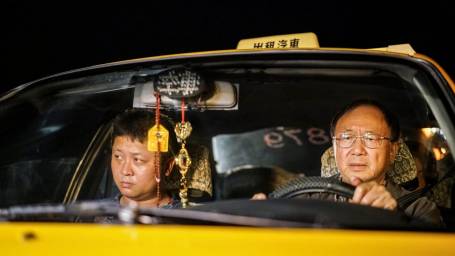
NA DOW AND MICHAEL HUI IN GODSPEED
A Taiwanese riff on the edge of noir
A young Taiwanese drug mule (Na Dow) has his foolproof smuggling method thrown out of whack when he catches a ride with the wrong cab driver, in this caper starring veteran Hong Kong comic Michael Hui, here playing a long time Taiwan resident and cabbie who insists on taking him even though he's already been driving all night.
As an Edinburgh Festival viewer of this film said, "Godspeed walks a weird line between violent gangster bloodshed and buddy comedy that doesn’t always work." It's a strange hybrid for which the word "Tarantinoesque" is a shade too generous. But there are eccentric, highly specific incidents. A Thai gangster is taunted by his Chinese associate for keeping his long sofa covered in its original protective plastic coating for ten years. So they take it of, and the owner proudly chortles over how like new it is. The cabbie stops to get food, and it turns out the line isn't for a restaurant but a gangster funeral. They are forced to go in and pay a donation.
The drug mule is notable for his laziness. He got the job merely by answering an ad. And instead of arranging a carefully planned, secure form of transportation, he just takes cabs back and forth to carry the drugs the whole way from one end of the country to another.
In festivals this film has been billed as a "dark comedy," but it is more accurate to call it "a crime drama with moments of levity." Uglier scenes featuring crime bosses that alternate with the road trip carry the greater sense of action: the trip itself verges on a Beckettian futility, alternating with serious mishaps. This is good material for the actors, potentially, at least - but the filmmaker has not quite got his mix of genres in good balance. Nice ending, though, turning this into the kind of lived-in buddy picture this has always aspired to; and the tech aspects are fine. Delicate use of mandolin music adds a pleasantly sentimental note to a very unsentimental, deadpan movie.
Godspeed / 路順風 (Yi lu shun feng), 111 mins. debuted at Toronto Sept. 2016, also at Vancouver, Tokyo, Taipei, Buenos Aires, Seattle, Edinburgh, Bucheon. Reviewed here for NYAFF, showing 1 pm July 16 at the Walter Reade Theater.
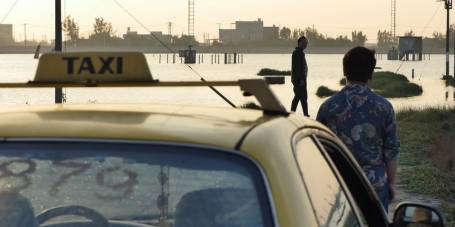
Last edited by Chris Knipp; 07-14-2017 at 01:12 PM.
-
THE LONG EXCUSE (Miwa Nishikawa 2016)
MIWA NISHIKAWA: THE LONG EXCUSE (2016)
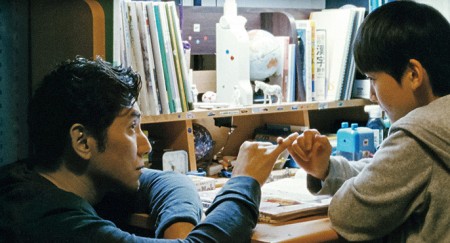
MASAHIRO MOTOKI, KENSHIN FUJITA IN THE LONG EXCUSE
Japanese males growing up
A film about awakenings, Miwa Nishikawa's The Long Excuse shifts focus. First it's on Sachio (Masahiro Motoki, oddly, in his first serious feature since the 2008 Oscar-winning Departures ), a novelist and minor TV celebrity past his prime. When first seen he's a cad who's rude to his hairdresser wife Natsuko (Eri Fukatsu) - he probably looks down on her socially - and totally self-centered when she dies in a bus that crashes into a frozen lake. He's sleeping with another woman when he gets the news; his wife's trip was just an excuse for him to have fun with his mistress. He lays his grieving on heavy for public attention - after all he's a TV personality, if minor - but he feels nothing. Attention shifts to Yoichi (Pistol Takehara), truly and dramatically (or at least simply and directly) grieving his wife, a friend of Natsuko's who was on a ski trip with her and died by her side in the bus.
Nishikawa, whose screenplay takes off from on her own novel, loads the dice, giving Sachio a life that favors superficiality and making Yoichi a truck driver who's not too bright so he can be a direct, simple guy. It works though. Attention shifts again when Sachio helps Yoichi take care of his pre-middle school son Shinpei (Kenshin Fujita) and preschool daughter Akari (Tamaki Shiratori) because Yoichi can't cope. Now Shinpei, whom his father had taken out of school to care for his little sister, has a chance once more of cramming to get into junior high. This enables Sachio to feel good about himself and delay facing the loneliness of his own grief. Action spans a year and Fujita, visibly growing into adolescence and rebellion, bright, angry, and at odds with his simple dad, steals the show, though the two adult males do some noisy fighting and growing up. Some interesting bonding and reality-checking take place here. Nishikawa doesn't avoid sentimentality 100%, but this is an interesting watch with fresh female angles on Japanese family life.
Maggie Lee notes in her Variety review that "as in her last three films — Sway, Dear Doctor, and Dreams for Sale all centered on liars and swindlers — self-deception is the theme" of this, Nishikawa's fifth film. Her depiction of men is a bit simplistic, though less so in the case of the vain writer and TV personality, but she is both astute and hopeful in suggesting a child might lead a superficial adult to become more real. In fact the kids and Sachio's bonding with the boy are expanded beyond Nishikawa's original novel. Some of the best details are here, for example the way Sachio draws a blank when left alone with little Akari, who won't answer his silly questions, or go out shopping with him, but will go when it's time to meet Shinpei at the bus. Many little details of the inexperienced adult engaged in the immense task of minding a small child are witty and well observed.
Midway comes the moment when Sachio's personal manager Kinoshita (Sosuke Ikematsu), young, but with four kids, points out to him that his surrogate parenting is just putting off his own grieving, which he's just dragging out. Kids are a great escape for a man, Kinshita points out: they let him forget "what an asshole I am." According to Maggie Lee's review, the novel was Nishikawa's effort to get at how collective mourning over the great 2011 earthquake led individuals to void dealing with their own real, immediate losses - as Sachio is doing here.
Sachio's still not really grieving when he starts doing a TV piece about the act of it. He's at the center always in the movie - and Masahiro Motoki bravely a shoulders the role of a jerk, if one who's learning, gradually earning our sympathy.
The Long Excuse / 永い言い訳 (Nagai iiwake), 124 mins., debuted at Toronto Sept. 2016; also Busan, Vancouver, Hong Kong, Rome, Kaohsiung (Taiwan) and other festivals including SFIFF (where I first saw it) and San Diego. Theatrical release Japan Oct. 2016. Reviewed here as part of NYAFF 2017, expanding my earlier SFIFF review based on a second viewing.
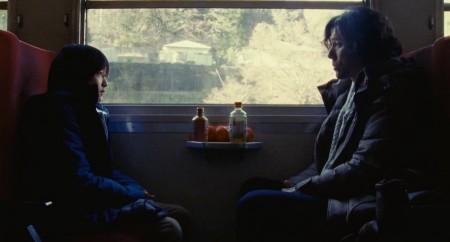
KENJIN FUJITA AND MASAHIRO MOTOKI IN THE LONG EXCUSE
Last edited by Chris Knipp; 07-15-2017 at 01:59 AM.
 Posting Permissions
Posting Permissions
- You may not post new threads
- You may not post replies
- You may not post attachments
- You may not edit your posts
-
Forum Rules





 Reply With Quote
Reply With Quote




Bookmarks